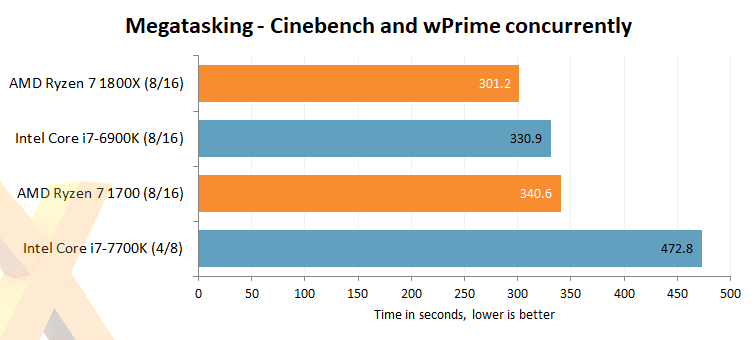Ryzen 7 Megatasking
Modern PCs are fast enough so that everyday tasks such as emailing and basic word processing happen instantly. In that respect, any good processor from the past five years is fast enough.
Yet there exist applications and scenarios where there's an insatiable demand for more performance. Content creators and digital artists often bemoan the hours it can take to render a project in a program such as Cinema4D, while enthusiasts who run applications in parallel want their system to finish the work as quickly as possible - perhaps so that they can spend time enjoying more thrilling pursuits such as gaming.
What these groups have in common is the need for a powerful system to be effective at what we can call megatasking, that is, doing lots of things at once, efficiently and quickly.
The base requirements for effective megatasking are simple enough: one needs a modern CPU architecture armed with lots of cores and threads, ideally at a keen price. AMD's all-new Ryzen 7 processors appear to have all of those checkboxes ticked right out of the gate, so let's take a look at how well it is able to megatask against established Intel competition.
We're using a Ryzen 7 1800X ($499) and Ryzen 7 1700 ($329) and comparing their performance against the Intel Core i7-6900K ($1,089) and Intel Core i7-7700K ($339), with the latter duo representing the best of the Broadwell and Kaby Lake architectures. One would expect the $1,100 processor to run rings around the other, due to its price, but both Ryzen 7 CPUs are armed with eight cores and 16 threads, meaning the megatasking fight is bound to be closer than the price tickets suggest.
As a recap, here is how the four chips punch in the vital-stat stakes.
AMD Ryzen 7 vs. Intel Core i7 Megatasking |
|||||||||||
|---|---|---|---|---|---|---|---|---|---|---|---|
Cores / Threads |
Cache |
TDP |
Base Clock |
Turbo Clock |
Memory |
Factor |
Price |
||||
| AMD Ryzen 7 1800X | 8 / 16 |
20MB |
95W |
3.6GHz |
4.0GHz |
DDR4-2666 |
AM4 |
$499 |
|||
| AMD Ryzen 7 1700 | 8 / 16 |
20MB |
65W |
3.0GHz |
3.7GHz |
DDR4-2666 |
AM4 |
$329 |
|||
| Intel Core i7-6900K | 8 / 16 |
20MB |
140W |
3.2GHz |
3.7GHz |
DDR4-2400 |
LGA2011 |
$1,089 |
|||
| Intel Core i7-7700K | 4 / 8 |
8MB |
91W |
4.2GHz |
4.5GHz |
DDR4-2400 |
LGA1151 |
$339 |
|||
A perusal of the table shows why AMD can be bullish about Ryzen 7's multitasking potential, because it matches the vastly more expensive Core i7-6900K's core and thread count and offers double the base capability of the price-equivalent Core i7-7700K.
The next question is how to test for megatasking. We chose a scenario that would thrash all available cores and threads to the maximum. To do this, we ran the full wPrime 1024M test and, at the same time, forced the processor to run the complete HandBrake benchmark. As the wPrime test finishes first, the overall time to encode the HandBrake video was taken into account, with a shorter time indicating better overall performance.
Excellent performance requires every part of the CPU's architecture to work in harmony, with the caches being hit hard, the execution units fully loaded at all times, and thread efficiency very much to the fore. Here is how the quartet fared.

It is obvious and clear that having more cores and threads is beneficial to running intensive applications concurrently. What is surprising, perhaps, is that the Ryzen 7 1700, outfitted with just a 65W TDP and therefore suitable to a wide range of systems, does so well - almost matching a $1,000 chip equipped with a much higher thermal limit.
Yes, the results might be somewhat different if we chose to run two, or more, different applications, but the bottom line is that for real power users who task their PCs to the maximum, AMD's Ryzen 7 has immense performance at price points that Intel cannot touch.
Really, there is no compelling reason to consider anything other than Ryzen 7 unless you want to effectively waste money on a premium build.
AMD Ryzen 7 processors are available at the following retailers:








